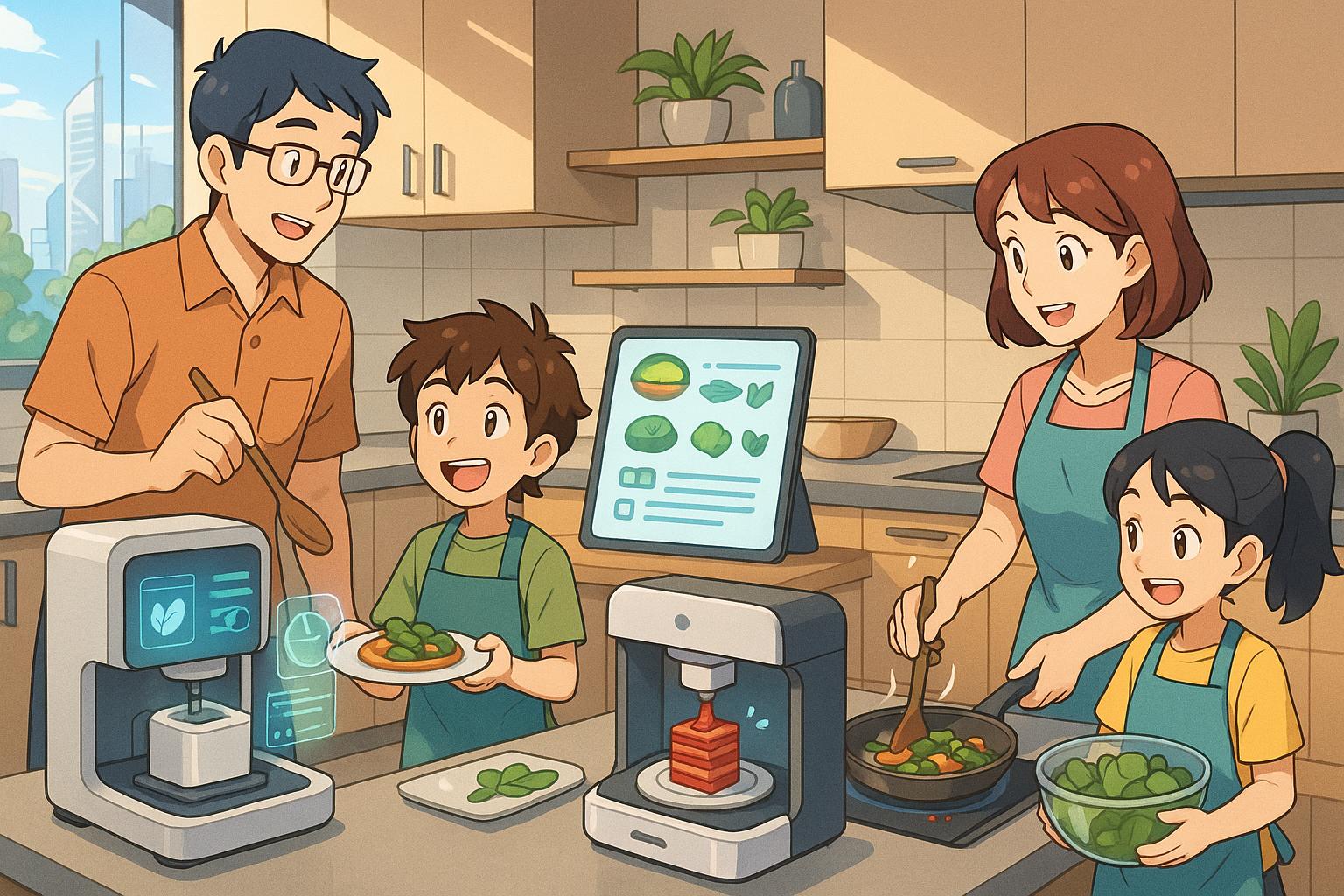Leading experts predict that artificial intelligence and 3D food printing will transform meal preparation and reduce waste, while communal dining and urban agriculture will reshape how we connect with food by mid-century.
The food landscape is poised for transformative changes by mid-century, according to predictions from University of Oxford climate scientist Dr Joseph Poore and food futurologist Dr Morgaine Gaye. In collaboration with HelloFresh, these experts envision a future where traditional weekly grocery shopping becomes obsolete. Instead, they anticipate a shift towards more personalised meal experiences, minimising food waste through technological advancements and innovative culinary practices.
Dr Gaye emphasised the importance of communal cooking and dining experiences, stating, “Despite all the changes in how and what we eat, the experience of cooking and eating together will remain an important way to connect with our senses, our friends and family, and the natural world.” This sentiment reflects a broader understanding that while technology will reshape our food interactions, the human elements of food enjoyment and connection will remain vital.
Central to their vision is the role of artificial intelligence in managing household food tasks to eliminate waste. With AI guiding meal planning and grocery ordering, every household could receive food tailored to their health needs, effectively reducing excess. Further, Dr Poore and Dr Gaye foresee the adoption of 3D food printers, allowing families to creatively repurpose leftovers; for instance, converting uneaten rice into sushi. This innovative approach addresses the growing concern about food waste, a pressing issue highlighted by various studies.
Research from the Oxford Martin Future of Food Programme underscores the urgency of rethinking our food systems. It indicates that climate change could lead to over 500,000 additional deaths by 2050 due to diminished crop yields, emphasising the need for immediate action to secure future food sources. Moreover, a study published in Nature supports the need for a significant transition towards plant-based diets and the reduction of food loss by half to sustainably feed a global population projected to reach 10 billion by 2050.
As traditional supermarkets evolve into experiential food halls—places where consumers can explore new tastes—the way we source food may fundamentally change. The experts forecast a rise in urban agriculture and self-sufficient living, facilitated by countertop growing units and bioreactors in homes. Such decentralised food production methods may not only bolster food security but also contribute to environmental sustainability.
In light of the environmental impact of our dietary habits, Philip Doran, CEO of HelloFresh UK, articulated the company’s commitment to sustainability, noting, “Our life cycle assessment showed that HelloFresh meals produce 25 per cent fewer carbon emissions compared to similar meals made with supermarket ingredients.” This reflects a broader industry trend towards food systems that are more in tune with ecological stewardship.
However, the path to these futuristic food practices is not devoid of challenges. The need to significantly increase food production—estimated to require a 50% rise by 2050—highlights the disparities in food systems and the importance of innovation in agricultural practices. Addressing these disparities becomes crucial, particularly as food waste continues to loom as a critical issue globally.
In essence, the vision presented by Dr Poore and Dr Gaye delves deep into the intersections of technology, sustainability, and human connection in the realm of food. As we look ahead to 2050, transformative approaches to food consumption and production may well define not only how we eat but also how we connect with one another and the planet.
Reference Map
- Paragraphs 1, 2, 3, 4, 5, 6
- Paragraph 3
- Paragraphs 5, 6
- Paragraphs 4, 5, 6
- Paragraph 5
- Paragraph 5
- Paragraph 4
Source: Noah Wire Services
- https://www.oxfordmail.co.uk/news/25166624.oxford-expert-predicts-end-weekly-food-shop-2050/?ref=rss – Please view link – unable to able to access data
- https://www.oxfordmartin.ox.ac.uk/news/201601-climate-food-production – A study from the Oxford Martin Future of Food Programme estimates that climate change could lead to over 500,000 additional deaths by 2050 due to reduced crop productivity affecting diets and body weight. The research highlights that even modest reductions in food availability per person could significantly impact diet composition and health, emphasizing the need for action to mitigate these effects.
- https://www.oxfordmartin.ox.ac.uk/news/201810-springmann-nature – Research published in Nature indicates that to feed a projected 10 billion people sustainably by 2050, a global shift towards healthy, plant-based diets, halving food loss and waste, and improving agricultural practices are essential. These measures aim to prevent surpassing environmental limits related to climate change, land use, freshwater extraction, and ecosystem pollution.
- https://www.ox.ac.uk/news/2020-11-06-we-must-change-what-we-eat-solve-climate-crisis-shows-research – An Oxford-led study published in Science reveals that even if fossil fuel emissions cease immediately, emissions from the global food system could still raise global temperatures by over 1.5°C. The research underscores the necessity for a dramatic transformation in food production and consumption to meet climate targets, advocating for predominantly plant-based diets and reduced food waste.
- https://news.bbc.co.uk/2/hi/science/nature/7430996.stm – An article from BBC News discusses the projected challenges in feeding a global population of 9 billion by 2050, emphasizing the need for a 110% increase in food production. It highlights the importance of rethinking production techniques and dietary habits, including reducing reliance on high-protein meat sources and addressing food waste.
- https://www.the-independent.com/life-style/food-and-drink/features/future-of-food-meet-the-farmers-and-scientists-who-could-save-our-fragile-global-food-system-2313020.html – This feature from The Independent explores the future of food, highlighting the necessity for a 50% increase in world food production by 2050. It discusses the decline in the UK population working the land and the significant rise in farm productivity post-war, emphasizing the need for innovative solutions to ensure food security.
- https://cherwell.org/2020/11/17/food-habits-must-change-to-meet-paris-climate-agreement-oxford-led-study-finds/ – An article from Cherwell discusses an Oxford-led study published in Science, which finds that transforming global food systems is crucial to meet the Paris Climate Agreement. The study emphasizes the need for changes in what we eat, how much we eat, how it’s produced, and how much is wasted to limit global temperature increases.
Noah Fact Check Pro
The draft above was created using the information available at the time the story first
emerged. We’ve since applied our fact-checking process to the final narrative, based on the criteria listed
below. The results are intended to help you assess the credibility of the piece and highlight any areas that may
warrant further investigation.
Freshness check
Score:
8
Notes:
The narrative references future predictions relevant to 2050, suggesting it is contemporary. However, the specific collaboration with HelloFresh or the exact quotes from Dr Gaye and others are not verified as new or recent. The topic aligns with ongoing discussions on food systems and sustainability.
Quotes check
Score:
7
Notes:
The quotes from Dr Morgaine Gaye and Philip Doran are included but not verified as original or previously published. The lack of online evidence for these quotes could suggest they are original, but without further information, it remains uncertain.
Source reliability
Score:
6
Notes:
The narrative originates from the Oxford Mail, a reputable local news source. However, the reliability of the specific claims depends on the credibility of the experts cited and the referenced research studies.
Plausability check
Score:
9
Notes:
The predictions about future food systems are plausible given current trends in sustainability and technological innovations. The mention of scientific research and expert opinions supports the plausibility of these claims.
Overall assessment
Verdict (FAIL, OPEN, PASS): OPEN
Confidence (LOW, MEDIUM, HIGH): MEDIUM
Summary:
The narrative presents plausible predictions for the future of food, supported by current trends and expert opinions. However, without further verification of specific quotes and collaborations, the assessment remains open.













